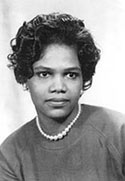A Constitutional Breakthrough (1927-1954, Section 15)
In 1954, the U.S. Supreme Court issued its groundbreaking and provocative opinion in Brown v. Board of Education (347 U.S. 483), an NAACP-sponsored case. Breaking away from earlier precedents, the unanimous decision declared that state laws requiring separate facilities for black and white children deprived black children of the equal protection of the law guaranteed by the Fourteenth Amendment to the United States constitution. The following year, the court ruled that integration should occur with “all deliberate speed,” but many white southerners continued to resist court-enforced integration.
Dr. Edith Irby Jones had entered the University of Arkansas College of Medicine in Little Rock in 1948 with little controversy. Yet, nine years later, following the Brown decision, Arkansas Governor Orval Faubus called out the National Guard to block the entry of nine black students to Little Rock’s Central High School. The students were admitted only after President Dwight D. Eisenhower usurped Faubus by federalizing the National Guard and by deploying elements of the 101st Airborne to Little Rock.
Nonetheless, while the fight for equality continued for decades, Brown v. Board of Education constituted a profound challenge to the status quo throughout the South. Doors had opened, if only a crack. Houston’s African-American physicians and other black Americans were ready and eager to push their way inside.


